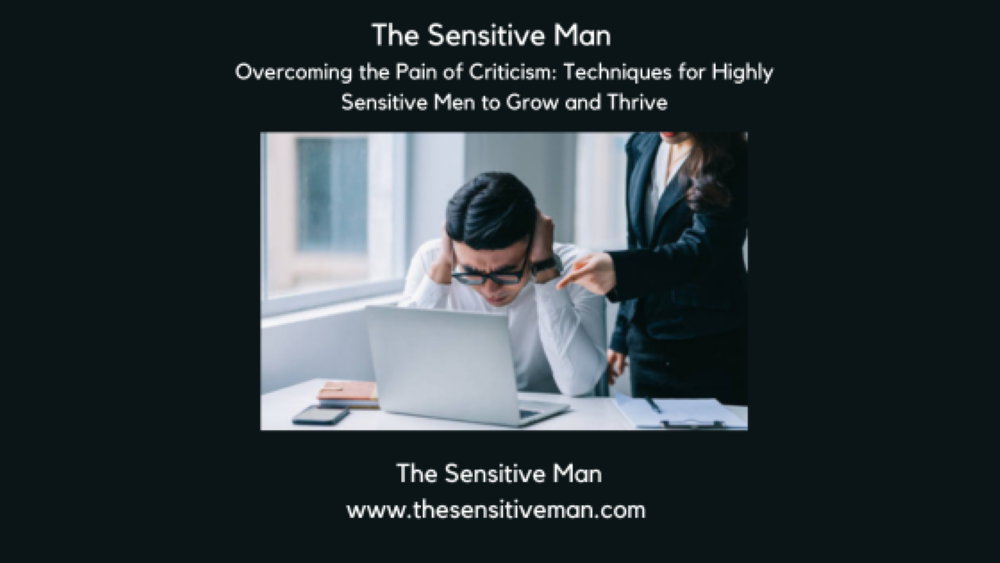The Sensitive Man - Cultivating Gratitude: A Path to Inner Strength for Highly Sensitive Men5/31/2023 A Blog about Sensory Processing Sensitivity from the Worldview of a High-Sensing Male
Total words 816, Time to read: 3 minutes 26 seconds Being a highly sensitive man comes with unique challenges, but it also presents an opportunity for deep introspection and personal growth. In navigating the complexities of life, one powerful tool that can greatly enhance well-being is gratitude. Practicing gratitude allows highly sensitive men to shift their focus from the negatives to the positives, fostering a positive mindset and nurturing their overall emotional health. What is Gratitude, and How Does It Affect Highly Sensitive Men? Gratitude is more than just saying "thank you." It is a transformative practice that involves acknowledging and appreciating the blessings, big or small, in our lives. For highly sensitive men, cultivating gratitude can profoundly impact their attitude and emotional well-being. It enables them to shift their perspective, focusing on the abundance and positivity surrounding them rather than getting overwhelmed by their challenges. Gratitude also plays a crucial role in managing emotions and reducing stress, providing a sense of inner calm and balance. Methods of Practicing Gratitude
When to Practice Gratitude
Things to Be Grateful for as a Highly Sensitive Man You possess unique qualities and strengths worth celebrating as a highly sensitive man. Consider focusing your gratitude on the following:
Benefits of Practicing Gratitude and Developing a Daily Habit By incorporating gratitude into your daily life, you can experience a range of benefits, including:
Practicing gratitude is a transformative journey that can profoundly impact the lives of highly sensitive men. By focusing on the positives, expressing appreciation, and reflecting on the blessings in their lives, they can foster a positive mindset, cultivate inner strength, and nurture their overall well-being. Embrace the power of gratitude in your life, starting today. Begin each day with gratitude, end each day with reflection, and watch as your perspective shifts, opening doors to a more fulfilling and joyful existence.
0 Comments
A Blog about Sensory Processing Sensitivity from the Worldview of a High-Sensing Male
Total words 817, Time to read: 3 minutes 26 seconds Being a Highly Sensitive Person (HSP) as a man can sometimes feel like a lonely journey. But the truth is, you're not alone. Understanding and embracing your HSP traits can lead to a transformative experience. In this article, we'll explore the importance of finding support as a highly sensitive man and discover ways to build and nurture supportive communities. Addressing Challenges and Embracing Strengths HSP men face unique challenges in a world that often values toughness and emotional suppression. However, acknowledging and embracing your sensitivity can unlock hidden strengths. Finding support allows you to navigate challenges while leveraging your empathetic nature, deep thinking abilities, and heightened intuition. The Importance of Fellowship with HSP Men Shared experiences and empathy: Connecting with fellow HSP men provides a sense of validation and understanding. Sharing experiences and stories can create deep bonds that combat the feeling of being misunderstood or different. Breaking stereotypes and fostering a sense of belonging: Society often perpetuates the idea that sensitivity is synonymous with weakness. However, fellow HSP men can challenge these stereotypes, creating a space where authenticity and vulnerability are celebrated. Support navigating relationships, careers, and personal development: HSP men encounter specific challenges in various aspects of life. Having a supportive community offers guidance and perspectives to help you navigate relationships, excel in your career, and foster personal growth. Likely Groups that Would be Supportive of HSP Men HSP-specific support groups and communities: These groups are tailored to the needs of highly sensitive individuals. They provide a safe space to share experiences, seek advice, and receive validation from others who can relate to your journey. Men's groups focusing on emotional intelligence and personal growth: Joining men's groups prioritizing emotional intelligence and personal development can provide a supportive environment for HSP men. These groups often encourage vulnerability, communication, and self-reflection. Mental health organizations and counseling services: Professional resources such as mental health organizations, therapists, or counselors can offer specialized guidance for highly sensitive individuals. They can help you develop coping strategies, manage overwhelming emotions, and build resilience. Creating and Nurturing HSP Men's Groups in Your Area or Online Identifying the need and gauging interest: Assess the demand for an HSP men's group in your area, or consider starting an online community. Seek feedback from other HSP men to gauge interest and determine the potential for a supportive network. Establishing a safe and inclusive space: Create guidelines that foster respect, empathy, and confidentiality within the group. Ensure that all members feel safe to express themselves without judgment or fear of criticism. Setting goals and objectives for the group: Define the purpose and objectives of the group, such as sharing experiences, providing support, and offering resources. Establishing goals helps maintain focus and direction for the community. Facilitating discussions, activities, and events: Organize regular meetings or online discussions to foster engagement and connection. Plan activities or events that promote personal growth, self-care, and mutual support. Utilizing online platforms and resources for remote participation: Leverage online platforms, social media groups, or forums to connect with HSP men globally. Virtual meetings, webinars, and online resources offer flexibility and accessibility for individuals in different locations. Finding Allies Outside of the Highly Sensitive Community Educating friends, family, and colleagues about HSP traits: Increase awareness and understanding of HSP traits among those closest to you. Openly discussing your sensitivity can lead to greater acceptance and support. Seeking empathetic individuals and supportive networks: Look for individuals who display empathy, compassion, and an understanding of your sensitivity. Building strong relationships with allies outside the HSP community can provide additional support and validation. Collaborating with mental health professionals, therapists, or coaches: Seek professional guidance from mental health professionals, therapists, or coaches knowledgeable about HSP traits. Their expertise can assist you in developing effective coping mechanisms and enhancing your well-being. You Are Not Alone Normalizing the HSP experience: Understand that being a highly sensitive man is a natural and valid part of who you are. Recognize that countless others share similar experiences. Sharing stories of personal growth and resilience: Hear stories of HSP men who have embraced their sensitivity and thrived. Learning from their journeys can provide inspiration and encouragement. Highlighting famous HSP men as role models: Recognize influential figures who have succeeded while embracing their sensitivity. Their stories serve as reminders that sensitivity can be a powerful asset. Celebrating the diversity and strength of the HSP community: Embrace the diversity within the HSP community. Recognize that HSP men come from various backgrounds, professions, and walks of life, proving that sensitivity knows no boundaries. Conclusion Finding and building supportive communities is crucial for highly sensitive men. By addressing challenges, embracing strengths, and seeking fellowship with fellow HSP men, you can cultivate a sense of belonging, navigate life's complexities, and nurture personal growth. Remember, you are not alone on this journey. So take the first steps to seek and create support, knowing a community is waiting to embrace you. The Sensitive Man - Nurturing Intuition: Empowering Highly Sensitive Men to Trust Their Inner Wisdom5/18/2023 A Blog about Sensory Processing Sensitivity from the Worldview of a High-Sensing Male
Total words 461, Time to read: 1.56 minutes In a society that often dismisses intuition and values logic and reason above all else, highly sensitive men face unique challenges. However, intuition holds immense power and potential for personal growth and decision-making. In this blog, we aim to encourage highly sensitive men to embrace their intuition, acknowledging its importance and exploring how it can enhance their lives. Cultural Norms and Intuition Societal expectations place heavy emphasis on men relying solely on logic and reason. Intuition and emotions are often seen as weak or unreliable, leading to their dismissal. These cultural norms stem from historical gender roles and societal constructs that prioritize rationality and discourage vulnerability and emotional awareness. Understanding Intuition Intuition is more than just a vague notion; it has a scientific basis. It is a deep knowing or gut feeling that transcends logical reasoning. Drawing from scientific research, we can understand intuition as a result of evolutionary processes and the mind's ability to process vast amounts of information unconsciously. Cultivating Intuition for Highly Sensitive Men Cultivating intuition requires conscious effort. Here are some practical tips to develop and nurture your intuition:
Utilizing Intuition in Everyday Life Incorporating intuition into decision-making can bring several benefits:
Defending the Use of Intuition by Highly Sensitive Men Addressing skepticism and criticism surrounding intuition is essential:
Trusting your intuition is a transformative journey for highly sensitive men. By embracing your inner wisdom, you can tap into a profound source of guidance and insight. Cultivating intuition, along with logic and reason, can lead to more authentic decision-making and a richer, more fulfilling life. Remember, your intuition is a powerful tool waiting to be harnessed. Trust it, nurture it, and let it guide you on your path of personal growth and self-discovery. A Blog about Sensory Processing Sensitivity from the Worldview of a High-Sensing Male
Total words:1229, Time to read: 6.43 minutes Overcoming the Pain of Criticism: Techniques for Highly Sensitive Men to Grow and Thrive As a highly sensitive person, receiving criticism or rejection can feel particularly overwhelming and painful. The highly sensitive trait is characterized by a deeper level of processing, which can lead to greater emotional intensity and a tendency to take things to heart. However, highly sensitive men can cope with criticism and rejection effectively. In this blog post, we will explore the roots of the pain associated with criticism and rejection, techniques for processing it, and strategies for avoiding manipulative and harmful criticism. The challenge of coping with rejection and criticism For highly sensitive men, criticism and rejection can feel like personal attacks. This can trigger various emotions, including anger, sadness, and anxiety. Learning to cope with criticism and rejection can be particularly challenging for highly sensitive men, but it is essential for personal and professional growth. Roots of the pain associated with rejection and criticism Understanding the sensitive person's experiences Highly sensitive men may have experienced rejection and criticism as particularly painful in the past. This can be due to a range of factors, including childhood experiences, socialization, and personality traits. This might also include not "measuring up" to the expectation for masculine behavior. These experiences can lead to a deep-seated fear of rejection and criticism, making it difficult to process feedback objectively. How sensitivity plays a role in processing perceived "attacks" For highly sensitive men, criticism and rejection can feel like a vendetta against them personally. This is because the highly sensitive trait is characterized by a deeply personal way of processing emotional content, which can lead to greater emotional intensity. The ability to sense subtle physical, mental, and vocal hostilities or perceived hostilities makes some HSP Men more likely to see criticism as destructive versus constructive. This high sensitivity to criticism may cause protective emotional barriers to kick in and block the constructive nature of the criticism from coming through. This reaction can be a conditioned response based on memories of past negative criticisms and may seem spontaneous and intuitive. Highly sensitive men may also tend to take things to heart, making it difficult to separate criticism from the perceived pain of past experiences. In many ways, this is a knee-jerk reaction based on not learning to receive criticism as a helpful attempt to correct erroneous behavior and make the individual mindful of possible corrections. However, there is also a perfectionism streak in many HSPs that make them vulnerable to criticism. The expectation is that they have been conscientious about their performance and expect that it is perfect without externally testing that theory. In this case, perfectionism is the enemy of excellence. Separating criticism from perceived pain Remaining objective about criticism One of the key skills for coping with criticism and rejection is to remain objective. This means recognizing that criticism is not a personal attack but an opportunity to learn and grow. It is important to focus on the content of the feedback and not let the emotions associated with it overwhelm you. Sometimes many who deliver criticism are not educated in the skilled delivery of critique, so that it may come across as harsh or brusque. Detecting this difference can help HSPs understand to separate the critic from the criticism. Preparing mentally for criticism Another technique for coping with criticism is to prepare mentally for it. This can involve reminding yourself that feedback is an opportunity for growth and setting realistic expectations for the feedback you may receive. Practicing mindfulness techniques to stay calm and centered in the face of criticism can also be helpful. Staying calm under fire and seeing the bright side Staying calm in the face of criticism can be challenging for highly sensitive men. However, it is essential to separate criticism from the perceived pain. One technique for staying calm is focusing on the feedback's positive aspects. This simple switch in thinking can involve looking for constructive feedback and recognizing that the feedback is an opportunity to improve. Techniques for processing criticism and rejection Accepting feedback gracefully Gracefully accepting feedback is an essential skill for coping with criticism and rejection. In short, this means listening actively to the feedback, acknowledging it, and expressing gratitude for the feedback, even if you don't agree with it initially. Techniques to calm the mind to accept criticism objectively A range of methods can help calm the mind and accept criticism objectively. These include mindfulness meditation, deep breathing exercises, and cognitive-behavioral therapy (CBT). Stopping your internal dialogue long enough to listen actively is key to ensuring you understand the criticism. Developing a positive attitude toward criticism Developing a positive attitude towards criticism can be challenging for highly sensitive men. However, dissecting the criticism for opportunities to grow and focusing less on the delivery is essential. This step involves recognizing that criticism is an opportunity to learn and grow and concentrate on the constructive aspects of the feedback. Stay positive. Learning from criticism to achieve goals and objectives One of the key benefits of criticism is that it can help you achieve your goals and objectives. Learning from criticism involves recognizing the areas you need to improve and developing an action plan to address them. When in doubt, ask for help. Knowing that you can act on the criticism moves you from a place of helplessness to a position of control. In the end, if the complaint does not resonate with you, you can always reject it. Building a long-term strategy for dealing with criticism and rejection Dealing with criticism and rejection is a lifelong process, and it is important to develop a long-term coping strategy. Part of this can involve setting realistic expectations, practicing self-care, and seeking support from trusted friends and family members. Avoiding manipulative and harmful criticism Recognizing the difference between constructive and destructive criticism Not all criticism is created equal. It is important to recognize the difference between constructive and destructive criticism. Constructive criticism is feedback intended to help you improve, while destructive criticism is feedback meant to harm or manipulate you. Setting boundaries to protect oneself One way to avoid manipulative and harmful criticism is to set boundaries. This can involve recognizing your limitations and being assertive about your needs. It can also include identifying when criticism is not constructive and choosing not to engage with it or the person delivering the negative feedback. Conclusion Reiterating that highly sensitive men can learn to cope with criticism and rejection Learning to cope with criticism and rejection is challenging for everyone, but it can be particularly difficult for highly sensitive men. However, with the right techniques and strategies, developing the skills needed to cope is possible. Encouraging the use of techniques listed to process rejection and criticism productively The techniques listed in this blog post can be helpful for anyone who struggles with criticism and rejection. By remaining objective, preparing mentally, and focusing on the positive aspects of feedback, it is possible to process criticism productively and constructively. Empowering highly sensitive men to see criticism as an opportunity to grow By learning to cope with criticism and rejection, highly sensitive men can develop the skills needed to grow and achieve their goals. By recognizing that criticism is not a personal attack but rather an opportunity to learn and improve, highly sensitive men can use feedback to become their best selves. |
AuthorBill Allen currently lives in Bend, Oregon. He is a certified hypnotist and brain training coach at BrainPilots.com. He believes that male sensitivity is not so rare, but it can be confounding for most males living in a culture of masculine insensitivity which teaches boys and men to disconnect from their feelings and emotions. His intent is to use this blog to chronicle his personal journey and share with others. Archives
July 2024
Categories
All
|





 RSS Feed
RSS Feed
